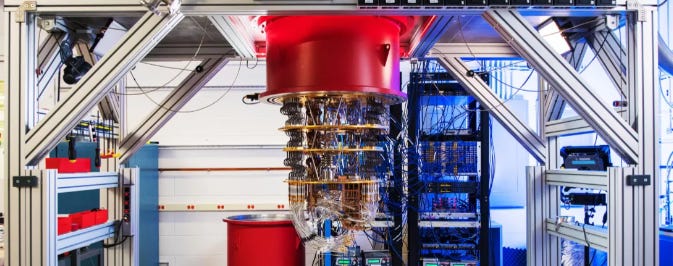Chinese scientists debunk Google Quantum Supremacy Claims
An ordinary supercomputer is all it takes
AUGUST 6TH, 2022 1:30 PM MONTREAL, CANADA
I have a summer discount going to reward my early backers and most passionate readers. I’m really grateful for the support.
Hey Guys,
I saw this outlandish story that I found a bit amusing. Google’s PR claim of “Quantum Supremacy” always seemed a bit bogus. Now, a team of scientists in China claim to have replicated the performance of Google’s Sycamore quantum computer using traditional hardware, thereby undermining the suggestion the company has achieved quantum supremacy.
It wasn’t so long ago, rewind to the year 2019. Back in 2019, Google proudly announced they had achieved what quantum computing researchers had sought for years: proof that the esoteric technique could outperform traditional ones. But this demonstration of “quantum supremacy” is being challenged by researchers claiming to have pulled ahead of Google on a relatively normal supercomputer.
China’s efforts in R&D, papers in AQ and A.I. seem to be increasing each year. As reported by Science magazine, the scientists used a system comprised of 512 GPUs to complete the same calculation developed by Google to demonstrate it had passed the quantum supremacy milestone back in 2019. How different even three years feels!
The endeavor was led by statistical physicist Pan Zhang, who said his team’s supercomputer performed the calculation 10 billion times faster than Google had thought possible.
Read the paper here:
Some of Google’s PR seriously backfires and seems out of touch with other research trends. Quantum computers like Sycamore are not better than classical computers at anything yet, it turns out according to the Chinese paper, with the possible exception of one task: simulating a quantum computer.
There is a lot of hype out there with companies, startups and even Governments making outlandish claims. Quantum advantage or Quantum supremacy are now terms used in all sorts of contexts. I like the term ‘AQ’ that implies some kind of convergence between quantum computing and artificial intelligence.
The Quest for quantum supremacy
Quantum supremacy (or quantum advantage) can be defined as the point at which quantum computers can outstrip the maximum potential performance of classical supercomputers in a particular discipline.
So why does the recent paper matter? The team at the Chinese Academy of Sciences led by Pan Zhang has published a paper describing a new technique for simulating a quantum computer (specifically, certain noise patterns it puts out) that appears to take a tiny fraction of the time estimated for classical computation to do so in 2019.
So much this is about powerful simulation and the ability to predict business outcomes or processes in science.
We Need More Research
Three years ago, Google announced it had achieved this feat with Sycamore, which it said took just 200 seconds to complete a statistical mathematics problem that would take a supercomputer 10,000 years to solve.
The problem was architected in such a way as to accentuate both the attributes of quantum computers, which exploit a phenomenon known as superposition to speed up calculations, and the limitations of traditional systems.
Historical Context
However, the claim was treated with suspicion by industry players from the beginning. The loudest critic was IBM, which claimed its Summit supercomputer would be capable of solving the same puzzle in two and a half days, given enough time to perfect the implementation. And now, a paper published by Zhang and his colleagues has cast further doubt over Google’s claims.
IBM, Microsoft, Amazon and others are also beginning to invest a lot in the future of quantum computing, as well as more Quantum computing startups which I cover on my Newsletter Quantum Foundry:
Zhang et al. cast the problem as a large 3D network of tensors, with the 53 qubits in Sycamore represented by a grid of nodes, extruded out 20 times to represented the 20 cycles the Sycamore gates went through in the simulated process. The mathematical relationships between these tensors (each its own set of interrelated vectors) was then calculated using a cluster of 512 GPUs.
TechRadar explained this really well:
As explained by Science, to replicate the performance of Sycamore, the scientists first had to reconfigure the problem as a 3D mathematical array called a tensor network. This meant they could use the system’s GPUs to perform calculations in parallel.
The low level of accuracy of Sycamore’s computation gave the Chinese team additional room for maneuver. By minimizing the accuracy target, they were able to accelerate the calculation by hundreds of times, replicating the same level of performance the quantum machine had achieved.
The Problem with Hype PR
The problem with a lot of the PR firms like Google and OpenAI are making is it’s somewhat deceptive. The Ad-based internet has normalized pointless boasting that actually leads to less trust in BigTech as a whole.
In Google’s original paper, it was estimated that performing this scale of simulation on the most powerful supercomputer available at the time (Summit at Oak Ridge National Laboratory) would take about 10,000 years — though to be clear, that was their estimate for 54 qubits doing 25 cycles; 53 qubits doing 20 is considerably less complex but would still take on the order of a few years by their estimate.
So a lot of those PR statements are rigged in their own favor.
As the Chinese here have used advanced algorithms and 512 GPUs to achieve quantum-level results, it begs a lot of questions!
It makes you wonder about how BigTech is now a PR factory where Microsoft is using LinkedIn to benefit its own image and Google is doing the same with search and its own powerful influence on discovery, e.g. suggested articles on Google search, Google News, etc…
I hope Quantum computing hype doesn’t fall prey to the same somewhat misleading tactics. The integrity of journalism has been alterted permanently by the Ad-based internet, and people are beginning to trust the Tech news and crypto news media industry as whole, leading more of us to get our news from social outlets like TikTok or via mobile search.
So instead of the 10,000 years Google claimed the task would take, Zhang’s group claims to have done it in 15 hours. And if they had access to a proper supercomputer like Summit, it might be accomplished in a handful of seconds — faster than Sycamore. Their paper will be published in the journal Physical Review Letters; you can read it here (PDF).
According to TechCrunch, these results have yet to be fully vetted and replicated by those knowledgeable about such things, but there’s no reason to think it’s some kind of error or hoax.
Google even admitted that the baton may be passed back and forth a few times before supremacy is firmly established, as it’s incredibly difficult to build and program quantum computers while classical ones and their software are being improved constantly. So the question remains how much can we trust PR statements they make on a field they are not a leader in? BigTech already lobby but how they impact misinformation online is also somewhat dubious when they are themselves like media companies.
Chinese scientists successfully proved IBM's point by attacking the original problem using advanced algorithms and compute power from today's GPUs to complete the calculation. That this Chinese team were able to do this so easily, really is quite shocking for the reputation of Google.
Some people in the Quantum computing field find the hype misrepresents their work. So why would a company like Google make claims that ultimately aren’t true? If I was bullish on quantum computing scaling soon, I’d just assume Google may have been hasty in its celebrations, as it is expected that the quantum supremacy milestone will fall sooner rather than later by virtue of the level of investment going into R&D activity in the space. But scalability issues like this are very hard to solve and usually take far more time in years and decades, than originally hyped to take.
The truth is we don’t actually know the impact of more scalable A.I., quantum machines and how convergence of all of these trends like ‘AQ’ will take shape. Not even Google is good at predicting it, even as they lead with DeepMind and Google AI in some areas. All claims of hype have to be taken in context.
Google’s damage control to real studies countering its PR claims remains to be seen. Google Quantum AI's principal scientist, Sergio Boixo, said the original 2019 paper acknowledged the likely future improvement to classical algorithms but doesn't believe today's classical computing approach can keep pace with quantum technologies. So there’s always an escape hatch for academics, PR and the games BigTech play on our ability to envision the future.
Academics are then paid to say whatever makes Google look good. As University of Maryland quantum scientist Dominik Hangleiter told Science, this isn’t a black eye for Google or a knockout punch for quantum in general by any means: “The Google experiment did what it was meant to do, start this race.” But it does validate much of the skepticism those in the quantum space felt back in 2019 about Google’s outlandish claims.
“I think they’re right that if they had access to a big enough supercomputer, they could have simulated the … task in a matter of seconds,” says Scott Aaronson, a computer scientist at the University of Texas, Austin.
How will the future of AI interact?
Hardware: More powerful supercomputers
Models: More scalable efficient language models
Quantum: Quantum machines with more qubits
Software: Evolution of Quantum Machine Learning
Capitalism: The continued evolution of Neo Surveillance Capitalism
Government: The investments in National Defense and the CCP that impacts this over the scope of many decades.
The truth is we don’t really know. In fact China may have a better idea about the long-term implications of A.I. at scale than Google or Microsoft does in isolation. This is because China makes strategic long-term bets on economic dominance of smart technologies and A.I. in long-term plans.
The Quantum aspect of this alone is going to transform our view of the future of artificial intelligence. But scalability is not near. A lot of work is going into improving performance by increasing the number of qubits on a quantum processor, but researchers are also investigating opportunities related to qubit design, the pairing of quantum and classical computers, new refrigeration techniques and more.
Claims of Quantum supremacy or Quantum advantage don’t necessarily make the world a better place, they just stoke an AI arms race of AQ now between the U.S. and China and their more powerful institutions, companies and best researchers. That’s an outcome that could actually be potentially dangerous.
What do you think?
If you think my work matters and my accountability journalism in the space is valuable, please consider a small donation to support me.







